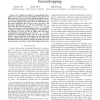Free Online Productivity Tools
i2Speak
i2Symbol
i2OCR
iTex2Img
iWeb2Print
iWeb2Shot
i2Type
iPdf2Split
iPdf2Merge
i2Bopomofo
i2Arabic
i2Style
i2Image
i2PDF
iLatex2Rtf
Sci2ools
CORR
2010
Springer
2010
Springer
Network Codes Resilient to Jamming and Eavesdropping
Abstract--We consider the problem of communicating information over a network secretly and reliably in the presence of a hidden adversary who can eavesdrop and inject malicious errors. We provide polynomial-time, rate-optimal distributed network codes for this scenario, improving on the rates achievable in [1]. Our main contribution shows that as long as the sum of the adversary's jamming rate ZO and his eavesdropping rate ZI is less than the network capacity C, (i.e., ZO + ZI < C), our codes can communicate (with vanishingly small error probability) a single bit correctly and without leaking any information to the adversary. We then use this to design codes that allow communication at the optimal source rate of C - ZO - ZI , while keeping the communicated message secret from the adversary. Interior nodes are oblivious to the presence of adversaries and perform random linear network coding; only the source and destination need to be tweaked. In proving our results we correct an...
CORR 2010 | Eavesdropping Rate Zi | Education | Hidden Adversary | Rate-optimal Distributed Network |
Related Content
| Added | 09 Dec 2010 |
| Updated | 09 Dec 2010 |
| Type | Journal |
| Year | 2010 |
| Where | CORR |
| Authors | Hongyi Yao, Danilo Silva, Sidharth Jaggi, Michael Langberg |
Comments (0)

